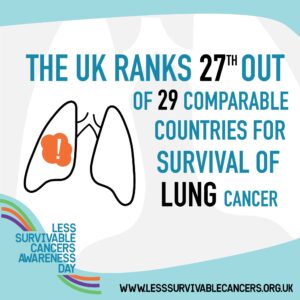
UK survival ranks among the worst in the world for deadliest cancers
Thursday 11 January 2024 (Less Survivable Cancers Awareness Day)
The UK lags woefully behind other countries for cancer survival according to data shared today by the Less Survivable Cancers Taskforce (LSCT).
The Taskforce, which represents six less survivable cancers: lung, liver, brain, oesophageal, pancreatic and stomach, with an average five-year survival rate of just 16%, has released the findings on Less Survivable Cancers Awareness Day to highlight the loss of life caused by this deadly cancer gap.
The findings released today are based on a new analysis of existing data and the world survival rankings of cancers of the lung, liver, brain, oesophagus, pancreas and stomach. The UK ranks below most other countries for these six cancers. [1]
The data shows that out of 33 countries of comparable wealth and income levels, the UK ranks as low as 28th for five year survival for both stomach and lung cancer. This rises slightly to 26th for pancreatic cancer, 25th for brain cancer and 21st and 16th for liver and oesophageal cancers respectively. [2][3]
The countries with the highest five year survival rates for less survivable cancers were Korea, Belgium, USA, Australia and China and the new analysis found that, if people in the UK survived at the same rate as those in these countries, then over 8,000 lives could be saved annually.[4][5] Currently, in the UK around 15,400 people will survive for five years following a diagnosis of a less survivable cancer – if the UK had survival rates comparable to the top five performing countries, this number could be close to 24,000. [6]
The reasons behind the UK’s lethal gap in survival are complex and experts believe they are likely to be a mix of delayed diagnosis and slow access to treatment. Many patients with a less survivable cancer will only be diagnosed after an emergency admission to hospital or an urgent GP referral after symptoms have become severe.
Currently in the UK, 7 in 10 patients receive no treatment at all for pancreatic cancer and of the 10,000 people diagnosed annually, just 10% receive surgery – the only potentially curative treatment. These poor outcomes are often the result of patients waiting too long for a confirmed diagnosis and for treatment to begin.[7] Similarly, in England, only 65% of people with a cancerous brain tumour are treated by surgery, radiotherapy and/or chemotherapy (the main potential treatments) in comparison to 85% of breast cancer patients.[8]
The less survivable cancers make up nearly half of all common cancer deaths in the UK and over 90,000 people are diagnosed with one of the less survivable cancers in the UK every year. Despite their prevalence, the less survivable cancers receive a fraction (16.6%) of research funding of more survivable cancers. [9][10]
Anna Jewell, Chair of the Less Survivable Cancers Taskforce, said:
“People diagnosed with a less survivable cancer are already fighting against the odds for survival. The figures we’re sharing today show that people living in the UK have even worse prospects than those living in comparable countries.
“We can see from these statistics that if we could bring the survivability of these cancers on level with the best-performing countries in the world then we could give valuable years to thousands of patients.
“If we’re going to see positive and meaningful change then all of the UK governments must commit to proactively investing in research and putting processes in place so we can speed up diagnosis and improve treatment options.”
Elliot Colburn MP, Chair of the All Party Parliamentary Group on Cancer, said:
“As Chair of the All Party Parliamentary Group on Cancer, improving outcomes for all cancers is something I’m passionate about. Less survivable cancers deserve particular and urgent attention due to the very severe outcomes often faced by people diagnosed with them.
“If we’re going to deliver world class care to cancer patients in the UK then we must bring ourselves on a level with other countries when it comes to diagnosis and treatment of less survivable cancers. I fully support Less Survivable Cancers Awareness Day and everyone working to improve outcomes for people diagnosed with these devastating cancers.”
50 year old Steven Cliff from Hampshire was diagnosed with advanced oesophageal cancer in 2021. He said:
“When I was first diagnosed it felt like the end of my life was imminent, it was terrifying. Since then I’ve had surgeries, several rounds of chemotherapy, radiotherapy and the heartbreak of finding out that the cancer had spread to my brain. Two years on and my latest scans show that things are stable and I am slowly beginning to rebuild my life.
“The NHS care I have received since being diagnosed has been exceptional, but if we could improve early diagnosis for these cancers so people don’t need to rely on the wonderful medical teams who have helped me, then it would make such a difference.”
The LSCT has hosted events at the House of Commons, Holyrood and the Senedd this week to talk to MPs, MSPs and MSs about the critical situation for people diagnosed with less survivable cancers and to call for a commitment from all UK governments to increase survival rates to 28% by 2029.
[1] 2010-2014 diagnosis period, data from CONCORD-3. Only countries with age-standardised, reliable data for each LSC considered.
[2] The data is based on research, originally published by the CONCORD programme for the world-wide surveillance of cancer survival, based in the London School of Hygiene & Tropical Medicine, during the period 2010 to 2014.
[3] See the full list of countries here
[4] The five best performing countries were found by calculating the rank of each country within each cancer and then the mean rank for each country across all cancers. Researchers then took the countries with the 5 best (i.e. lowest) mean ranks – to find the countries that, on average, perform the best across all six less survivable cancers. See the full list of countries here.
[5] Estimated by comparing the CRUK incidence projections to get the number of less survivable cancer annual cases in the 2023-2025 period. Researchers then calculated a mean average of the number of five year survivors based in each of the top five country’s survival rates and the UK incidence rates. This was then repeated using the UK survival rates. All survival rates are taken from CONCORD-3 data.
[6] Currently, in the UK 15,427 people will survive for five years following a diagnosis of a less survivable cancer – if the UK had survival rates comparable to the top five performing countries this number could be 23,775. This is a difference of 8,348 lives.
[8] https://www.cancerdata.nhs.uk/treatments
[9] Over 90,000 people will be diagnosed with either lung, liver, brain, stomach, pancreatic and oesophageal cancer in the UK each year. These six cancers account for more than 67,000 deaths a year – around a half of all cancer deaths. Figures are for 2016-18, compiled from Cancer Research UK: https://www.cancerresearchuk.org/health-professional/cancer-statistics/statistics-by-cancer-type
[10] Between 2002 and 2014, the less survivable cancers received just 16.6% of research funding of more survivable cancers. https://lesssurvivablecancers.org.uk/the-less-survivable-cancers/
5 year survival – world rankings:
| Country | Brain rank | Liver rank | Lung rank | Oesophagus rank | Pancreas rank | Stomach rank |
| UK and nations rankings (out of 33 countries) | ||||||
| UK | 25th | 21st | 28th | 16th | 26th | 28th |
| England | 27th | 25th | 27th | 15th | 25th | 25th |
| Northern Ireland | 21st | 26th | 30th | 8th | 29th | 24th |
| Scotland | 24th | 12th | 29th | 25th | 32nd | 31st |
| Wales | 12th | 21st | 31st | 21st | 31st | 32nd |
NOTES
Data is based on new analysis of the CONCORD programme for the world-wide surveillance of cancer surviva:l https://csg.lshtm.ac.uk/research/themes/concord-programme/ The latest CONCORD data (CONCORD-3) recorded world-wide surveillance of five-year survival for patients diagnosed with cancer during the period 2010 to 2014.
#DeadlyCancerGap
#LessSurvivableCancersDay
The Less Survivable Cancers Taskforce:
The LSC launched in 2017 and represents six less survivable cancers, lung, liver, brain, oesophageal, pancreatic and stomach, with an average five year survival rate of 16% due to a legacy of neglect and underfunding.
The LSCT is a partnership of charities supporting patients who have these cancers including Action Against Heartburn, British Liver Trust, Pancreatic Cancer UK, The Brain Tumour Charity, Guts UK, the Roy Castle Lung Cancer Foundation and Tenovus Cancer Care. It is supported by: Pancreatic Cancer Action, OCHRE, Brainstrust, HCCUK, Heartburn Cancer UK, OG Cancer NI, Brain Tumour Research, Barrett’s Oesophagus
The LSCT aims to increase the survivability of less survivable cancers to 28% by 2029.
Visit: www.lesssurvivablecancers.org.uk
Pancreatic cancer and Pancreatic Cancer UK:
Less than 7% of people with pancreatic cancer in the UK will survive beyond 5 years.
80% of people with pancreatic cancer are not diagnosed until the cancer is at an advanced stage.
Symptoms include: pain in the back or stomach area, unexpected weight loss, yellowing of the skin and whites of the eyes (jaundice), indigestion, changes to bowel habits, loss of appetite, recently diagnosed diabetes.
Pancreatic Cancer UK is taking on pancreatic cancer through research, support and campaigning to transform the future for people affected.
Visit: www.pancreaticcancer.org.uk
Liver cancer and the British Liver Trust:
Liver cancer is the sixth most common cancer, the third cause of cancer- related death and accounts for 7% of all cancers. Liver cancer death rates have soared by around 50% in the last decade. In the UK, the 5-year survival remains at around 12% for liver cancer and survival rates have hardly changed in the last 10 years. 80 – 90% of cases of primary liver cancer are linked to cirrhosis (damage and scarring) of the liver which is most often caused by viral hepatitis, alcohol and obesity.
Symptoms include: unintentional weight loss, loss of appetite, feeling very full after eating, feeling and being sick, pain or swelling in your abdomen, jaundice (yellowing of your skin and the whites of your eyes), itchy skin, feeling very tired and weak, fever with shivers, vomiting blood, dark black tarry poo, dark urine.
Visit: www.britishlivertrust.org.uk
Brain tumours and The Brain Tumour Charity:
Brain tumours are the ninth most common cancer in the UK. 60% of people diagnosed with a high-grade brain tumour will die within one year and just 12% will survive for five years or more. Symptoms can include: headaches, nausea or vomiting, vision or speech problems, fits (seizures), mental or behavioural changes, such as memory problems or changes in personality. The Brain Tumour Charity is the largest dedicated funder of research into brain tumours globally. The Charity is currently funding more than £34 million of world-class research across the UK and internationally and provides a wide range of trusted support services for those affected. The Brain Tumour Charity has launched a new campaign —“Better Safe Than Tumour” — to raise awareness of the common signs and symptoms of brain tumour. The campaign aims to support the public to be aware of the possible signs and symptoms and to get any concerning or persistent symptoms checked out by a doctor.
Visit: https://www.thebraintumourcharity.org/
Oesophageal cancer, Action Against Heartburn:
In the UK, there are about 9,200 cases of oesophageal cancer diagnosed each year (CRUK). Only 15% of adult oesophageal patients survive this cancer for 5 years or more. Symptoms include: difficulty swallowing, persistent indigestion or heartburn, loss of appetite and weight loss, vomiting, pain or discomfort in stomach, chest or back, a persistent cough, hoarseness, tiredness and shortness of breath. The UK has the highest incidence of oesophageal adenocarcinoma in the world. The cancer risks are higher for men, people aged over 50 years and those who are obese.
Visit: https://www.actionagainstheartburn.org.uk/
Stomach cancer and Guts UK
Around 6,700 people are diagnosed with stomach cancer in the UK each year (CRUK).
Stomach cancer is more common in men than women. More than 5 out of 10 cases (50%) occur in people aged 75 or over (CRUK). Survival rates for people with stomach cancer in England and Wales:
More than 45 out of 100 people (45%) will survive their cancer for 1 year or more, around 20 out of 100 people (20%) will survive their cancer for 5 years or more, 15 out of 100 people (15%) will survive their cancer for 10 years or more (CRUK).
Symptoms include: indigestion that doesn’t go away, trapped wind, heartburn, feeling full very quickly when eating, feeling bloated after eating small amounts, feeling sick (nausea) or being sick, tummy pain or pain behind the breastbone, difficulty swallowing (dysphagia), unexpected weight loss.
Guts UK funds research to fight diseases of the gut, liver and pancreas so no one suffers in silence or alone.
Visit: https://gutscharity.org.uk/
Lung cancer and Roy Castle Lung Cancer Foundation
Lung cancer is the most common cancer in the world. Over 46,000 people are diagnos in the UK every year. There are many different causes of lung cancer. Smoking is the leading cause of lung cancer. This means smokers and ex-smokers have an increased risk of getting lung cancer. However it is by no means the only cause; in fact 28% of lung cancer cases aren’t caused by smoking.
Symptoms include: A cough that does not go away or gets worse, coughing up blood, chest pain that is often worse with deep breathing, coughing, or laughing, hoarseness, weight loss and loss of appetite, shortness of breath, feeling tired or weak.
Roy Castle Lung Cancer Foundation is the only UK lung cancer charity dedicated to helping everyone affected by the disease.
Visit: www.roycastle.org


